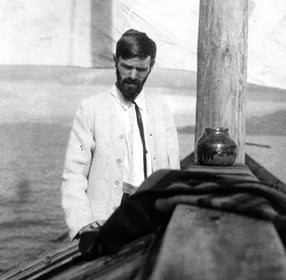There are only two things now,
The great black night scooped out
And this fire-glow.
This fire-glow, the core,
And we the two ripe pips
That are held in store.
Listen, the darkness rings
As it circulates round our fire.
Take off your things.
Your shoulders, your bruised throat!
Your breasts, your nakedness!
This fiery coat!
As the darkness flickers and dips,
As the fireflight falls and leaps
From your feet to your lips!
This poem is in the public domain. Published in Poem-a-Day on December 29, 2024, by the Academy of American Poets.
“New Year’s Eve” by D. H. Lawrence appears in his poetry collection Look! We Have Come Through! (B. W. Huebsch, 1917). In 1972, The Massachusetts Review published “The Hostile Sun: the Poetry of D. H. Lawrence” by American writer and novelist Joyce Carol Oates. In the article, Oates wrote, “Nothing in Lawrence is without ambiguity, but it is possible that much that seems to us morbid is really Lawrence’s brutal insistence upon the separation of one part of the self from the other, the conscious self from the unconscious, and both from the truly external, the unknown and unknowable Infinite. In the cycle of confessional poems called Look! We Have Come Through! (1917) […] Lawrence does more harm than good with his prefatory foreword and ‘argument,’ when he suggests that the sequence of poems is about a young man who ‘marries and comes into himself. . . .’ Certainly the spiritual crisis Lawrence suffered at this time had something to do with his private life, with the circumstances of his elopement, but not all marriage is attended by such a radical convulsion of the soul. Lawrence’s marriage, like everything else in his life, must be considered epiphenomenal in relationship [sic] to the deeper, less personal emotions he attempts to comprehend.” Oates went on to note, “[T]he problem for Lawrence, as it is for any mystic [is that] he must use ordinary language, but he must use it to express an extraordinary event (unless he chooses, as Thomas Merton declares the poet must, to separate entirely his mystical life from his life as an artist).”

